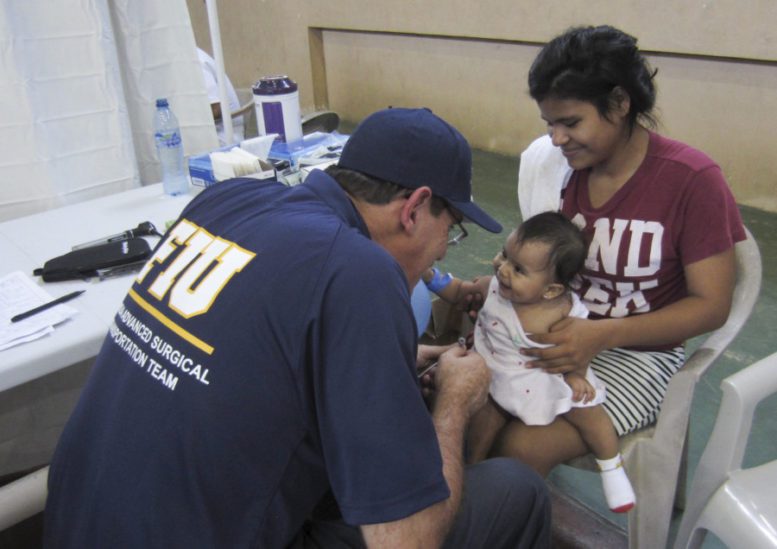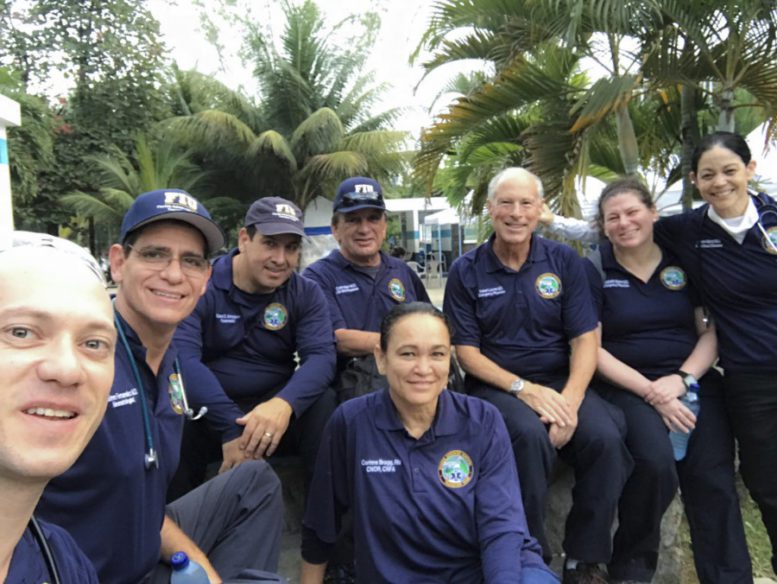
It was first come, first serve; so the patients, about 600 a day, camped out overnight and spent up to 10 hours in line to be seen by a doctor – doctors (and nurses) who themselves traveled more than 3,000 miles to see them, at a makeshift clinic set up inside a basketball court with no air conditioning.
“It was overwhelming. From the moment we arrived, we saw the huge crowds of people lined up, making food, dancing, just waiting their turn. They had started lining up the night before,” says infectious disease specialist Dr. Aileen Marty, one of eight members of the FIU Florida Advanced Surgical Transport Team (FIU-FAST) back from a 12-day medical mission to Puerto Barrios, Guatemala.
FIU-FAST is the university’s all-volunteer team of medical professionals trained to respond to disasters, but this humanitarian mission was more about building bridges and showing the team’s capabilities and organization. The trip was part of Continuing Promise ’17, an ongoing military/civilian project led by the U.S. Southern Command that provides medical, engineering and veterinary assistance to its partner nations and organizations.
Dr. Elizabeth Abram, an emergency medicine physician, says she was impressed with the team’s seamless collaboration with the Navy. “This was an opportunity to model a civilian and military joint rapid response for the next disaster.”
Team leader Ruben Almaguer says what made the mission truly special is what he refers to as the reason there is an “I” in FIU. “We were able to help these people, comfort them, teach them and make a difference,” he says.
Almaguer, a paramedic, was accompanied by a surgical nurse and six doctors – three emergency medicine physicians, a gynecologist/obstetrician, a pediatrician/neonatologist and an infectious disease specialist.

Speaking to a reporter in Puerto Barrios, CDR, Dr. Robert Lennon, head of the Navy mission, thanked the FIU contingency. “They have been an amazing support,” he said. “They brought many specialties that we didn’t have – [allowing] us to care for more people and provide a higher level of care for some people. So we’re very grateful for their help.”
By the time they returned home, FIU-FAST team members had seen more than 1,500 patients. They also helped distribute much-needed medical supplies to a local hospital and identified an area where, for the first time in years, cases of Leishmaniasis, a tropical infection transmitted by sandflies, are breaking out unbeknownst to local health authorities. They diagnosed diseases many health care workers on the mission had only seen in books, and showed great compassion in seeking out and caring for society’s neglected children at an orphanage run by nuns and at a rehab center for the hearing impaired.
“I left my heart there with those children and those families,” says Dr. Jaime Fernandez, who was deeply touched by the experience. Fernandez, a pediatrician, was in high demand seeing some 50 children a day. “Many of these kids hadn’t seen a doctor in years,” he says. “We saw parasites, anemia and poor nutrition, in general, but then we also saw some cases that were unusual and sad and sometimes there was nothing we could do.”
Among them, a seven-year-old boy with legs that looked like wings. He was born with spina bifida, a condition where the bones of the spine don’t form properly around part of the spinal cord causing weakness or paralysis in the legs. “Here we usually see it in an ultrasound and correct it in-utero or immediately after birth,” Fernandez says. “But in this case the mother had carried the child strapped to her back for years and over time the skin had grown over the legs.”
Fernandez and Marty tended to a toddler with microcephaly which they believe was caused when his mother contracted Zika during pregnancy.
They all agree it was challenging. Without the benefit of the latest technology – just some basic lab equipment, a microscope and limited medications, all provided by the military – team members had to rely on their clinical acumen to make a diagnosis and provide treatment.
The easy part was dealing with the patients.
“There were lots of big smiles and hugs,” says Dr. Robert Levine, an emergency medicine physician. “And many of them offered us a blessing, ‘Que Dios los bendiga’ (God bless you), for the small amount of light we let into their lives.”
Learn more about the FAST team in the video below.
[youtube https://www.youtube.com/watch?v=betKG4b5zi4]





